Sep 19, 2025 – Cambodia Day 2, Site Visit for Battambang High School Construction
Hello. Today, Sunim visited a high school site in Battambang, Cambodia, and discussed the additional construction of a girls’ dormitory.
After morning practice, Sunim had breakfast at 6 AM. Students from Sihanouk Raja Buddhist University had carefully prepared the meal.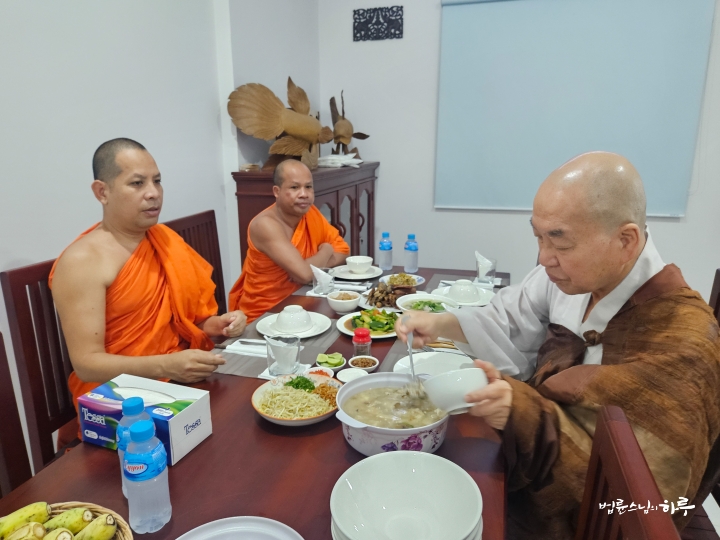
After breakfast, at 7 AM, Sunim departed for the site where the construction of Battambang High School is being planned. While JTS does not typically support high schools, Sunim decided to visit the site in person due to repeated requests from Venerable Sovichia.
Upon arriving at the site at 7:40 AM, the district governor, village representatives, parents, teachers, students, and villagers were all present. Students welcomed Sunim’s group by waving Cambodian and Korean flags.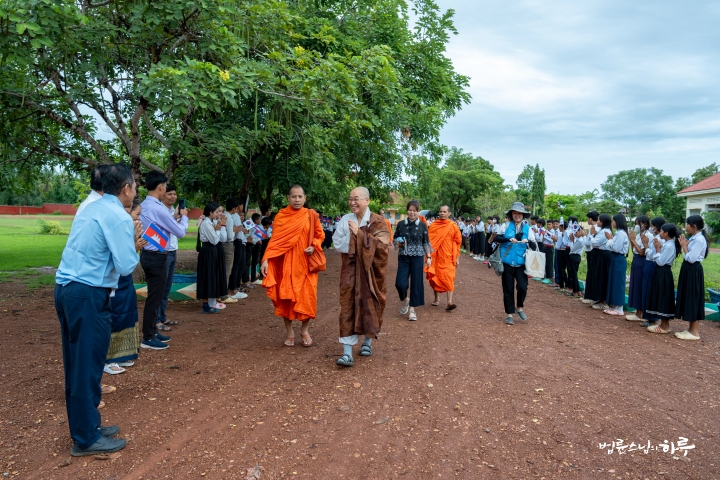
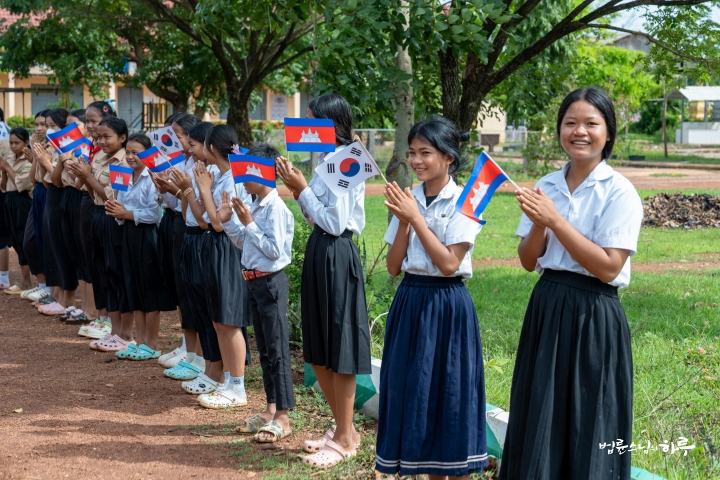
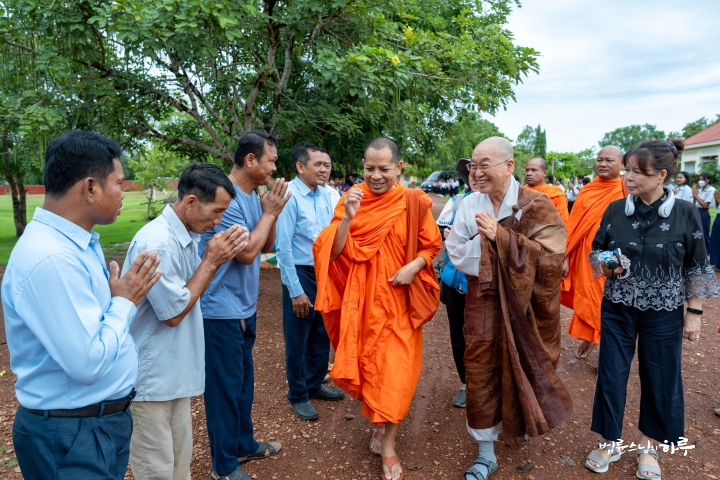
Gathering at Kakaoh Secondary School, Sunim engaged in conversation with the villagers. Starting with greetings from the Deputy Director of Education, Venerable Sovichia introduced the Korean delegation, and the village representative explained the necessity of establishing a high school.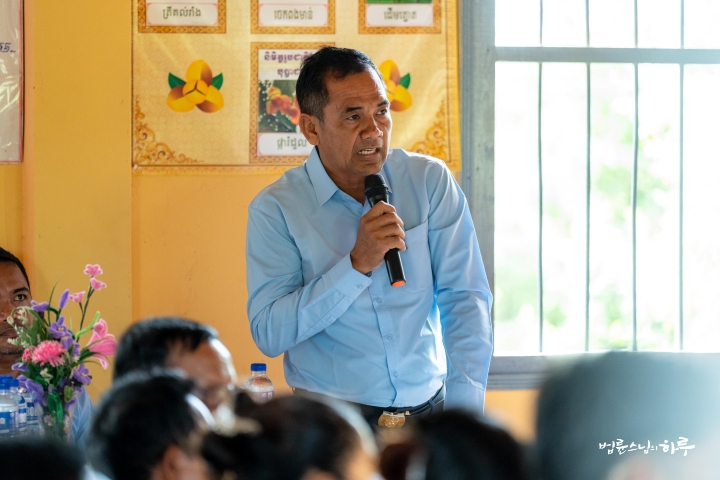
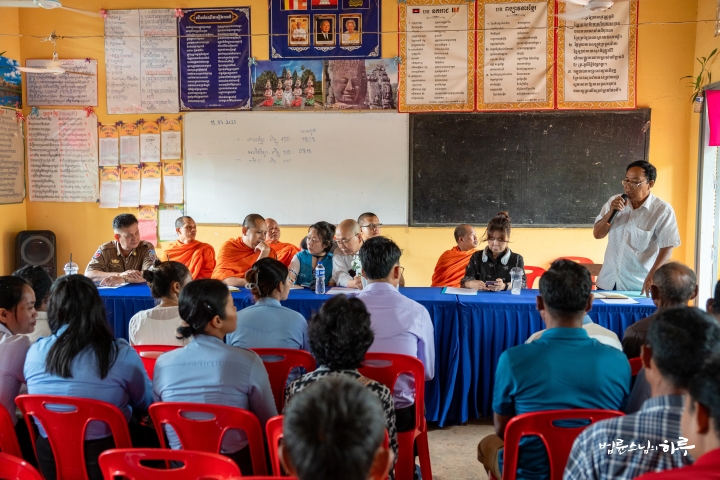
“Currently, our district has only two high schools, which is severely insufficient. While there are three middle schools in this area, there is not a single high school. The nearest town is over 10 kilometers away, making it too expensive for students to live independently and difficult to commute due to limited transportation. Commuting by bicycle poses high traffic accident risks. For these reasons, many students give up on high school education, and female students, in particular, rarely attend high school.
Therefore, we wish to establish a high school on this middle school site. However, the Department of Education says they cannot build a new school due to budget constraints. The villagers are willing to contribute some costs through fundraising, so we earnestly request your support to make the establishment of this high school possible.”
Finally, Venerable Sovichia requested a few words from Venerable Pomnyun Sunim.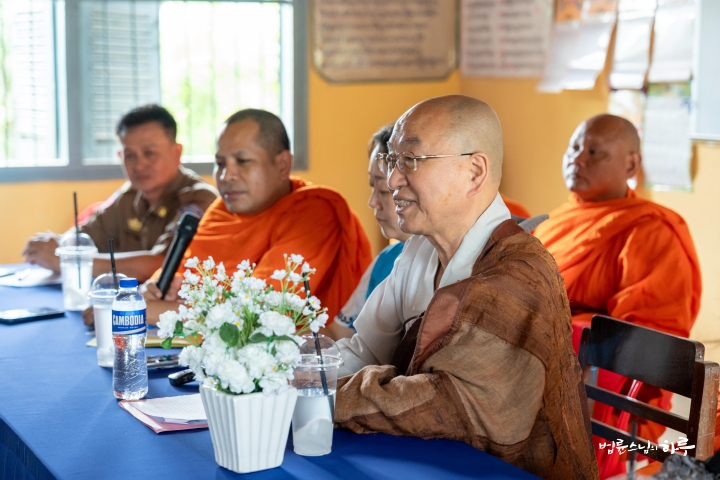
“I come from Korea. Like Cambodia, when temples in Korea receive money, monks primarily use it to build temples. However, according to the Buddhist scriptures, which contain the Buddha’s teachings, helping those in need is considered a greater Buddhist service than building temples. Therefore, instead of building temples, we have focused on three things: feeding the hungry, treating the sick, and helping children who cannot even attend elementary school to receive education. For this reason, if this area didn’t even have an elementary school, it would qualify for JTS support.
We also provide emergency support during major disasters like floods or earthquakes. We build schools in very remote areas, conflict zones, or places where there are no schools for children with disabilities – areas where the national system doesn’t reach. Perhaps that’s why Venerable Sovichia requested our support, but I’m sorry to say that high schools are not within our scope of work. But why doesn’t the Ministry of Education build a high school here?”
“The government budget is insufficient.”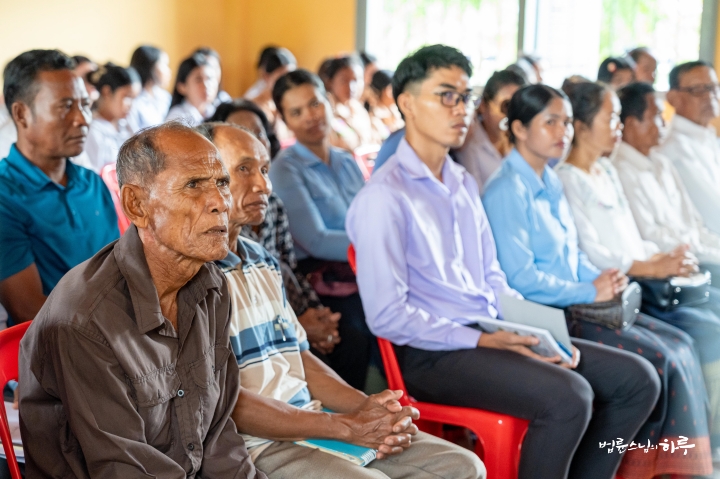
“JTS has experience building nearly 10 elementary schools in Ratanakiri Province in northeastern Cambodia 20 years ago. However, I believe that now that the Cambodian government has achieved a certain level of economic capability, it is appropriate for the government to build high schools. Nevertheless, with JTS, we can consider a collaborative approach. For example, if the government and Ministry of Education find it difficult to allocate a budget, we could explore a model in which the local government and village contribute a portion and JTS supports the remainder. When JTS built a school for children with disabilities in the Philippines, the local government covered 30% of the total budget, and JTS provided material costs to build it together.”
Following Sunim’s remarks, discussions continued about allocating responsibilities among the government, village, and JTS, after which the conversation concluded.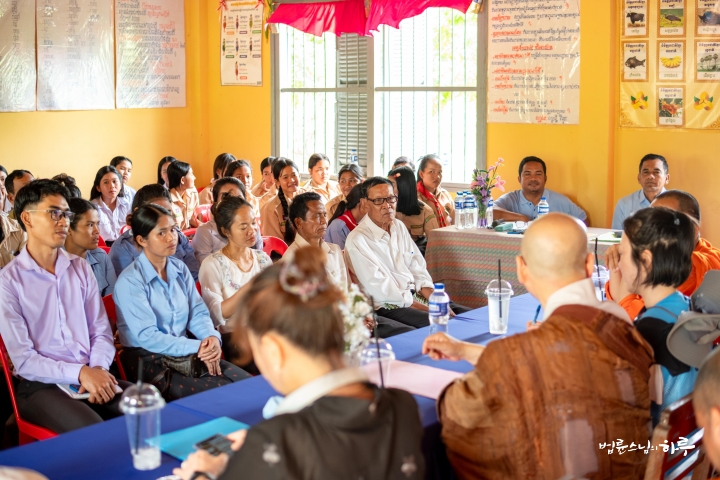
After the discussion, everyone went outside to take a commemorative photo together.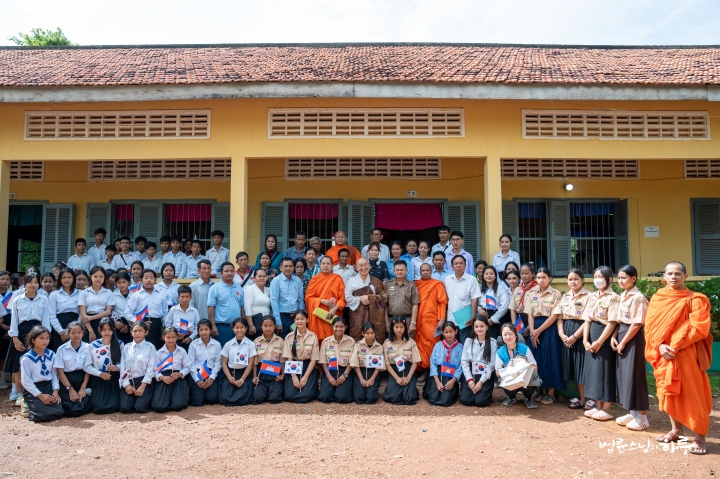
On the way back from viewing the site, Sunim briefly visited another elementary school that Venerable Sovichia is supporting. An American couple who visited 20 years ago initially established this school, and Venerable Sovichia, who served as their interpreter at the time, has been volunteering to expand the school ever since.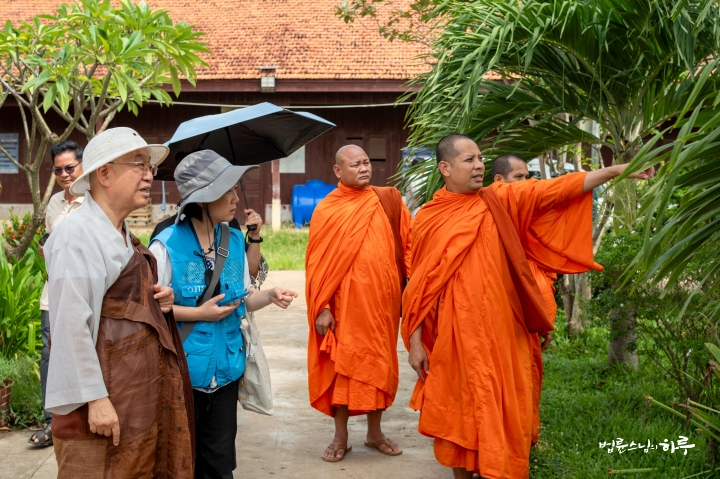
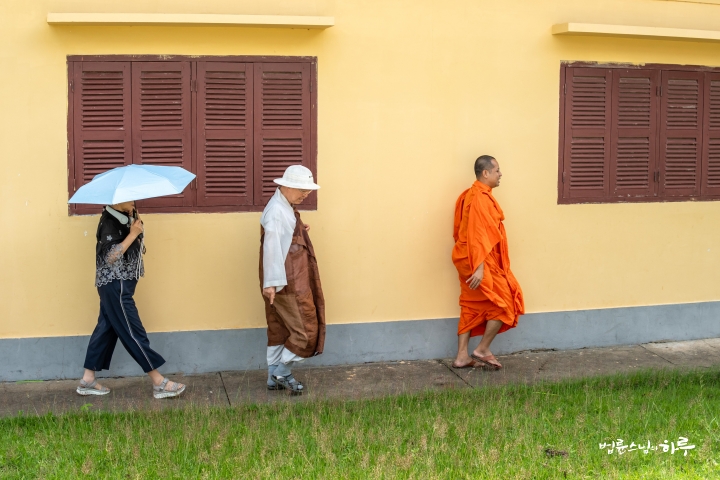
At 10:40 AM, Sunim returned to Sihanouk Raja Buddhist University and discussed the construction of the girls’ dormitory and high school establishment with Venerable Sovichia.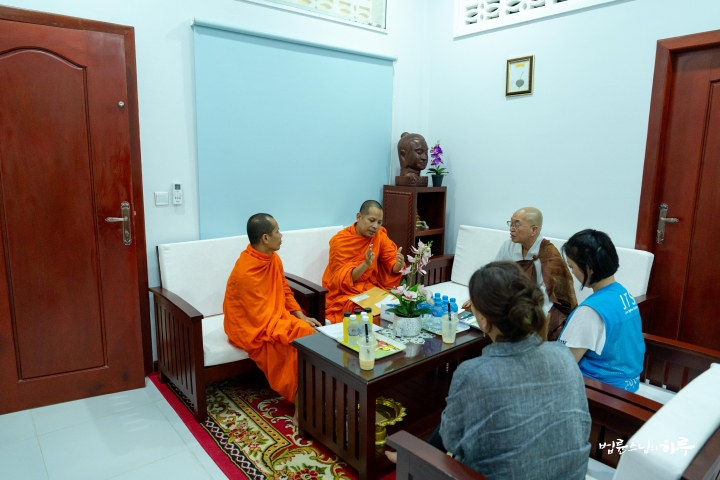
They planned to build two dormitory buildings instead of one due to insufficient capacity, and Venerable Sovichia agreed to prepare and submit budgets for each. For the high school, they decided to proceed with JTS supporting the remainder if the government and residents share certain portions. The final decision will be made at the JTS board meeting after Sunim returns to Korea.
At 11:30 AM, lunch was served. Once again, the Buddhist university students had carefully prepared the meal.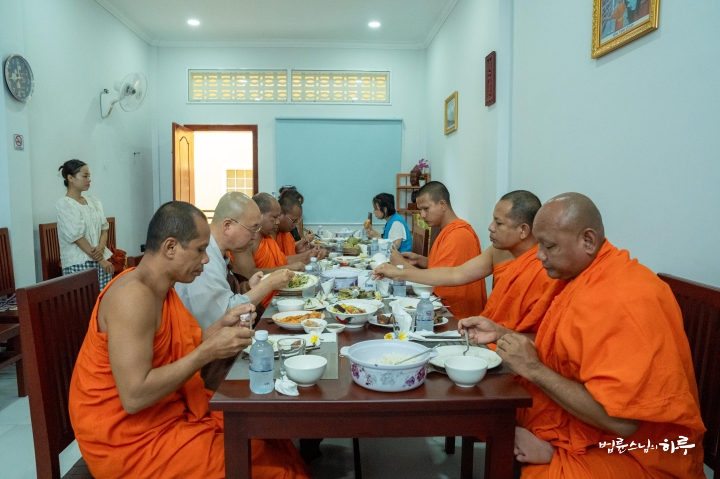
One of the students who prepared the meal mentioned she would soon visit Jungto Society through the INEB women’s activist study program. Sunim presented her with an English translation of his book. Another student planning to visit Jungto Society has a congenital skin condition, so arrangements were made for dermatological treatment during her visit to Korea.
After the meal, Sunim gave Venerable Sovichia a donation to help with securing the dormitory site. The school had purchased the dormitory site but had only paid a deposit and not the full amount yet.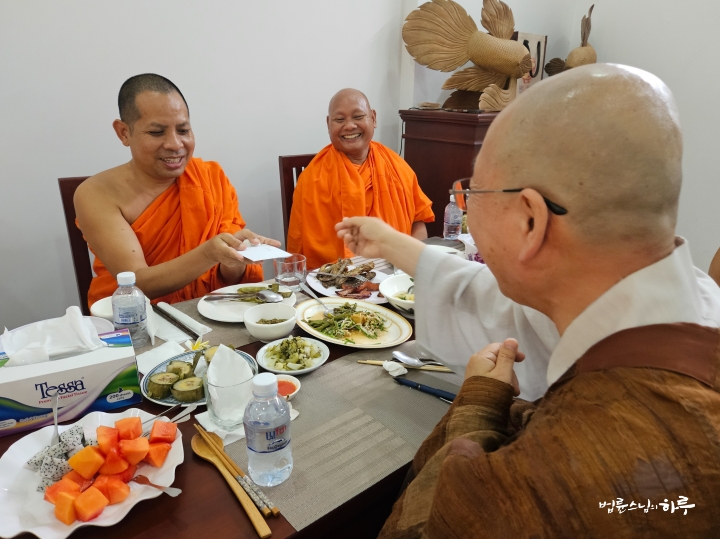
Sunim said he would depart earlier than scheduled since all the monks here must be busy. Venerable Sovichia offered to see them off, but Sunim repeatedly declined. Sunim said with a smile in English:
“I don’t like you. Don’t come!”
“The more you don’t like me, the more I want to come.”
Everyone present burst into laughter. In the end, Venerable Sovichia accompanied them to Siem Reap Airport, saying it was fine since today was a holiday. Just before departure, monks who had visited Jungto Society through the INEB study program came to pay their respects. Sunim presented them with English translations of his books and took commemorative photos together.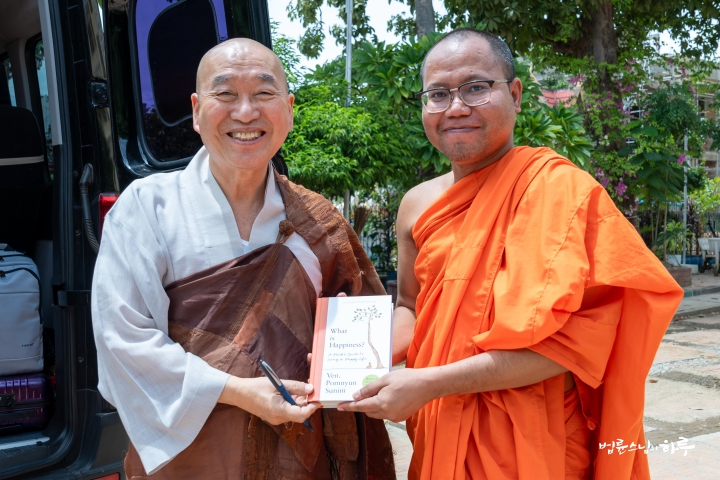
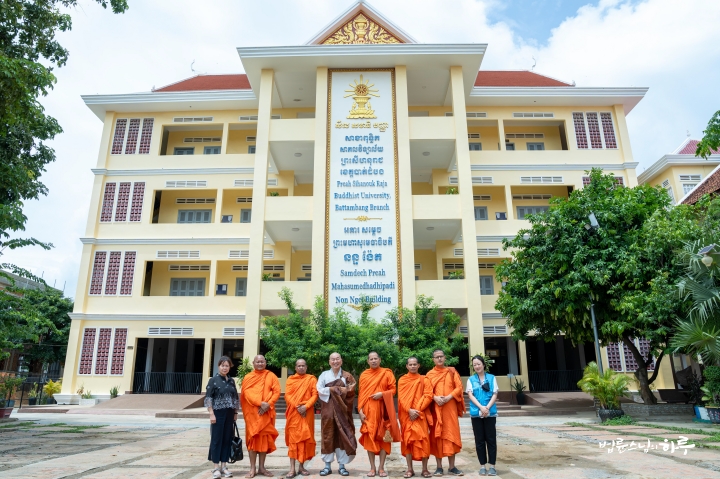
Departing Battambang at 12:30 PM, after a four-hour drive, they arrived at Siem Reap Airport at 4:30 PM. Sunim bid farewell to Venerable Sovichia and several other monks.
“Please tell the students this: Because they are using the dormitory cleanly and effectively, we have decided to build more dormitories. Please be sure to tell them to continue studying hard and living well.”
“Yes, the students will be happy to hear that.”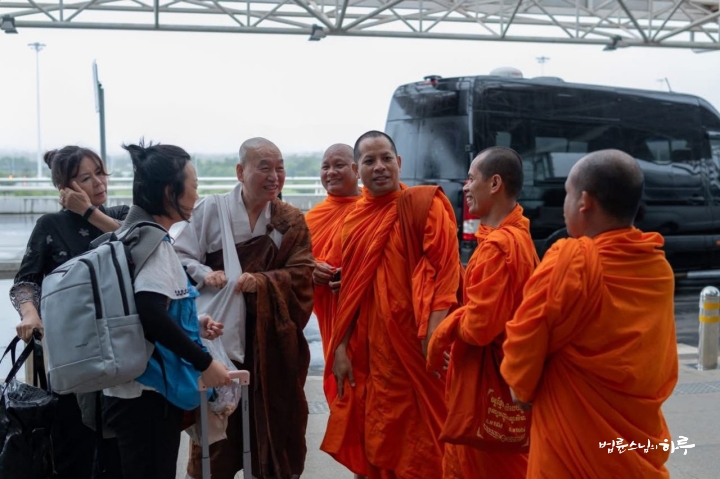
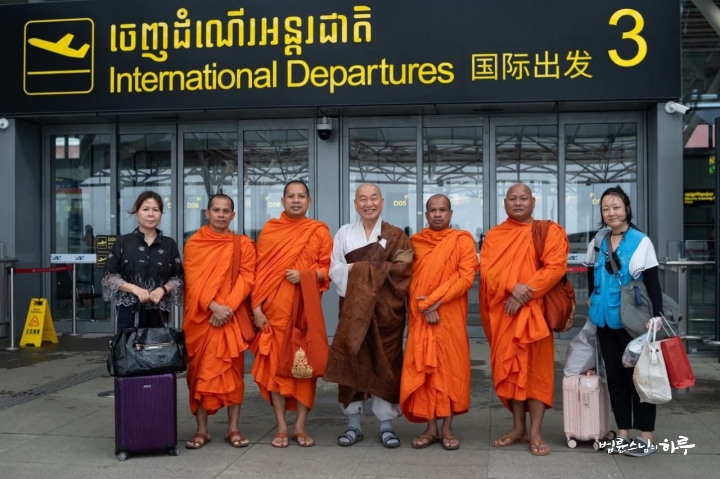
Though it was a short stay, the monks and students at the Buddhist university in Battambang provided exceptional hospitality. After expressing gratitude, Sunim entered the airport and went through departure procedures. Sunim’s group departed Siem Reap Airport at 7:25 PM and arrived at Bangkok’s Suvarnabhumi Airport at 8:55 PM.
At the airport, Jungto Society member Hwang So-yeon and her husband were waiting and drove them to their accommodation. They arrived at the accommodation at 10 PM and concluded the day’s schedule. Tomorrow, Sunim plans to visit the Nan area in Thailand where ethnic minorities live.
Since there was no Dharma talk today, I’ll conclude by sharing a dialogue between Sunim and a questioner from the Dharma Q&A held in Düsseldorf, Germany on the 11th.
My Husband Gets Upset Easily Due to His Narrow-Mindedness. Do I Have to Live Like This Forever?
“Even siblings who grow up in the same house with the same parents have different personalities. How much more different must people be who grew up in different houses with different parents? When getting married, you must stand on the perspective that your partner is very different from you. Generally, we keep in mind to some degree that others with whom we have no relationship will be different from us. That’s why we don’t take issue with their behavior.
However, when we examine how we come to date or marry someone among countless people, we find that during conversation, we discovered commonalities like hometown, hobbies, beliefs, or ideologies. Whether it’s hiking, basketball, painting, music, or any hobby, when we discover even one thing in common, we begin to feel somewhat close. That’s how we become friends, date, and get married.
But the human mind has a tendency, for efficiency, to automate things that repeat. When something is repeated once, twice, three times, it eventually happens automatically without intention. That’s where the term ‘skilled worker’ comes from. When you become familiar with the same task through repetition, it eventually happens unconsciously and automatically. Personality and habits are also states that have been automated through repeated behaviors. When we ask someone ‘Why did you do that?’ after they’ve done something, they often say ‘I did it without realizing.’ This means it was performed automatically without conscious awareness. That’s why we also say things like ‘I did it unconsciously’ or ‘I did it out of habit.’ Habitual, unconscious actions are an efficient way to save energy. The brain automates things that are repeated. While automation has the benefit of saving energy, negatively speaking, it becomes habitualization.
When you meet someone and discover many similarities, your brain mistakenly thinks ‘We’re the same in everything!’ and an automated response occurs. Thinking everything is the same, you don’t feel tense, feel close, and the relationship becomes comfortable. But what happens when you actually get married and live together with this premise of being the same? Everything is different again. You keep discovering differences one by one. When you first meet, because difference is the premise, goodwill arises when similarities are discovered. But once our brain has made the premise of sameness, negative thoughts arise when differences are discovered. When couples actually live together after marriage, they have different preferences for seasoning, and for food. You might get annoyed that they use the toilet standing when you’d prefer sitting, or they throw clothes anywhere instead of putting them in their place. Looking closely, everything is different. Not just personality, but overall lifestyle habits show differences. Then negative thoughts start arising in your mind. ‘I can’t live with this person!’ These feelings gradually grow, and after living together for about 10 years, avoidance occurs. ‘That person is just like that!’ The heart becomes cold. But because you have children and are economically tied together, you just live as cohabitants. You see each other only when sexual desire is needed, and just get by. This is our life.
So the most important thing to know is that ‘being different is normal.’ I’m not saying everything is completely different. We have similarities, but being different from each other is the basic foundation. And if you’re even from different countries, there are many more differences. So first, you must acknowledge the differences. But our brain always sees things different from us as wrong, using ourselves as the standard. If this is here and that is there, they’re each in their own position, but from this perspective, that is on the right, and from that perspective, this is on the left. This is using myself as the standard. Because we unconsciously use ourselves as the standard, when I’m ahead, I think about those behind, ‘Why are they dawdling? Why aren’t they coming quickly!’ and when I’m behind, I think, ‘Why is that person in such a hurry? Why aren’t they going together!’ This is how our thinking works.
Right now, you don’t understand your partner because you’re looking at them from your own standard. But from your husband’s perspective, he doesn’t understand you. From my view, you’re on the right, but from the other person’s standard, I’m on the left. From the perspective of the person ahead, the person behind is slow, but from the perspective of the person behind, the person ahead is going fast. Because thinking works this way, conflicts inevitably arise when we live together. 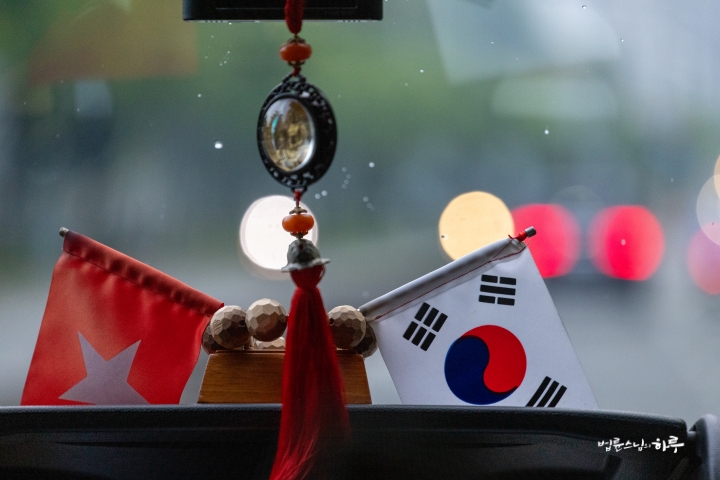
You need to study your husband and respond accordingly. You’ve been living together for 10 years, yet you still don’t know him well. Doesn’t that mean you’re either lazy or ignorant? Some people like to be praised, some prefer direct feedback, and others appreciate patience. Everyone is different, so you adjust as you live together. You can’t know everything in advance and match perfectly. If you don’t want to adjust to your partner, then you shouldn’t get married.”
“I know what my husband likes and dislikes, but when the situation actually arises, I get angry too, and I can’t control myself in that moment.”
“There’s a Korean saying that when you’re angry, you can’t see anything. Not being able to see means being ignorant. Just as there’s a saying that greed blinds you, when you become greedy, you become ignorant. You’re being ignorant. Normally, if someone threatens you with a knife or gun, you should be afraid and run away. But when you’re angry, you actually go closer, bare your stomach, and dare them to stab you. This is a sign of madness. Everyone can have moments of temporary madness. When you’re angry, fear disappears, and you challenge others to kill you. When you’re angry like this, you can’t see anything, so wisdom disappears in that moment. The thought that ‘this will cause me harm’ vanishes. You think, ‘So what if I lose? If I die, I die!’ You don’t consider profit or loss, life or death—this is the state of being angry.
That’s why the Buddha said, ‘First, don’t be greedy. Second, abandon anger. Third, abandon ignorance.’ These three can be summarized in one word: ignorance. When you’re angry, you become ignorant; when you’re temperamental, you become ignorant; and being originally unaware is ignorance—this is called ‘greed, anger, and ignorance.’ You might think it’s just daily life because you often live in anger, but being angry is a kind of madness that brings tremendous loss. So when solving any problem, you shouldn’t hate the other person. If you hate, you’ll get angry. Solving problems peacefully means solving them wisely. When you’re angry, you can only respond violently. Whatever path you choose is up to you. Since you’ve lived well for 10 years while being angry, you’ll probably continue to live well. Just keep living in anger.” (Laughter)
“Thank you. I understand now.”





